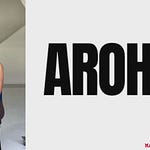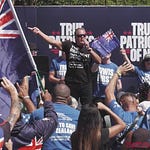In yesterday’s waka-wreck of an interview with Jack Tame, Oriini Kaipara was forced to confront her own words: “I thought that as long as I don’t get a result that’s less than 80% Māori I’ll be happy.”
When Tame pressed her on this, Kaipara suddenly backpedalled, feigning surprise, “Is that what I said?” before drifting into a vague ramble about being curious to learn “what else” she was. It was an uncomfortable moment, and it exposed the shaky foundation beneath her carefully curated image.
The truth is, if you go back seven years, the cameras captured her real reaction. When the DNA results revealed she was 1% Scandinavian and 1% Caucasus (Turkey, Iran, Iraq), her face said it all. Instead of embracing her mixed heritage, she looked unsettled, almost repulsed. That discomfort told the story of someone deeply conflicted about who they are.
For a person who regularly lectures others about identity, whakapapa, and the importance of “knowing who you are,” Kaipara’s response was telling. It showed that her pride in heritage comes with strict conditions. She celebrates being Māori when it fits the narrative, but when confronted with the reality that her bloodline, like everyone else’s, is diverse and intertwined, she recoiled.
Kaipara has placed herself in the public square not just as a journalist, but now as a would-be political figure. She promotes a brand built on cultural authority, however the foundations of that brand are shaky. When the image you sell to the public is undermined by your own reactions and past words, people begin to see through the performance.
At the heart of this is a deeper issue with identity politics. When worth is measured in percentages of DNA rather than character or contribution, it creates an impossible standard, one that Kaipara herself seems unable to live up to. Instead of embracing the reality that New Zealanders come from many backgrounds, she chose to play a numbers game with her own whakapapa, only to stumble when the results were not “pure” enough for her liking.
Yesterday’s interview highlighted that fragility. Rather than owning her words, she tried to rewrite them. Rather than embracing the truth of her ancestry, she sidestepped. Rather than showing leadership, Aunty revealed the contradictions at the core of her message.
If Oriini Kaipara wants to be taken seriously beyond the teleprompter, she will need more than carefully crafted soundbites and cultural posturing. She will need honesty, consistency, and the courage to accept her own heritage without flinching.
Because right now, the only thing her performance proves is that her message is skin-deep.












